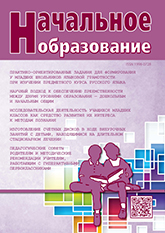The article reveals the peculiarities of education in pre-school and primary link in the Western countries (primarily in Germany): positive and negative influences on the development and quality of primary education, methods of its estimation are analyzed. The criteria of readiness of children for the transition from preschool to elementary school are described. The general and the particular in the primary education system of various countries of the West are given.
pre-school stage, preparation for school, Primary School, continuity, methods of assessing student achievement, especially the organization of training.
Окончание. Начало – № 3, 2016.
В настоящее время программы подготовительных групп в большинстве стран ориентированы на развитие у детей представлений об окружающем их вещественном мире, навыков самопознания и социального поведения. Соответственно, по-разному выбираются и приоритеты при определении показателя готовности к школе. В центре внимания может быть изучение родного языка и развитие речевых навыков (Австрия) или развитие интеллекта, наблюдательности, быстроты запоминания, точности выражения мысли, творческого воображения (Болгария) [19, c. 39]. В ряде скандинавских стран способность детей к обучению в школе рассматривается как результат самого обучения независимо от проявленного ими общего уровня развития к моменту поступления в первый класс. Финляндия находится в числе лидирующих стран
по успеваемости (качеству подготовки) учащихся, выявленных в процессе международных исследований (ПИЗА, ТИМСС, ПИРЛС). В этой стране при зачислении детей в школу не признается дифференцированный подход к определению их способностей, а также деление на «слабых» и «сильных». Принимаются все, включая детей с нарушениями в развитии, и, таким образом, достигается «равенство результатов». В Швеции дифференциация детей по показателю способностей или успеваемости запрещена законодательно. В Германии, напротив, строго дифференцированный подход и отбор по способностям носит открыто селективный характер.
1. Abasov Z.A. Shkol´naya otmetka: plyusy i minusy [School stamp: the pros and cons]. Narodnoe obrazovanie [Education]. 2015, I. 8, pp. 121-127. EDN: https://elibrary.ru/VHWVZX
2. Bozhovich L.I. Lichnost´ i ee formirovanie v detskom vozraste [Personality and its formation in childhood]. Moscow, Prosveshchenie Publ., 1968. 464 p.
3. Edinyy gosekzamen v obshcherossiyskoy sisteme otsenki kachestva obrazovaniya: materialy III Mezhdunarodnoy konferentsii «Natsional´nye ekzameny v sisteme otsenki kachestva obrazovaniya» [Unified state examination in the nationwide system of evaluating the quality of education: the materials of the III International Conference "National examinations in the system of education quality assessment"]. Narodnoe obrazovanie [Education]. 2006, I. 2, pp. 7-17.
4. Zagvozdkin V.K. Finskaya sistema obrazovaniya: model´ effektivnykh reform [The Finnish education system: a model of effective reforms]. Moscow, Chistye prudy Publ., 2008. 32 p.
5. Komenskaya V.G., Kotova S.A. Aksiologicheskaya paradigma zdorov´ya: o rossiyskom obrazovanii [Axiological health paradigm of Russian education]. Vestnik universiteta im. A.I. Gertsena [Bulletin of the University of them. AI Herzen]. St. Petersburg, 2007, I. 6, pp. 95-97.
6. Lebedeva S.A. Problema detskoy igry: materialy Vserossiyskoy zaochnoy pedagogicheskoy konferentsii [The problem of children´s games: Proceedings of part-time teacher conference]. Kirov. 2008.
7. Naydenova N.N. Sotsial´no-pedagogicheskie faktory mezhdunarodnykh issledovaniy v otsenke kachestva obrazovaniya. Institut teorii i istorii pedagogiki RAO [Socio-pedagogical factors of international studies to assess the quality of education. Institute of Theory and History of RAO pedagogy]. Moscow, Izdatel´skiy tsentr IET Publ., 2012. 257 p. EDN: https://elibrary.ru/PXCXSD
8. Opyt integratsii doshkol´nogo i nachal´nogo obrazovaniya za rubezhom: sb. nauchnykh trudov. Institut teorii i istorii pedagogiki RAO [Experience of integration of pre-school and primary education abroad: Sat. scientific papers. Institute of Theory and History of RAO pedagogy]. Moscow, Izdatel´skiy tsentr IET Publ., 2013. 326 p.
9. Pisareva L.I., Savina A.K., Voskresenskaya N.M. Opyt reformirovaniya sistem obrazovaniya v zarubezhnykh stranakh [The experience of reforming the education systems in foreign countries]. Moscow, ITIP RAO Publ., 2004. 65 p.
10. Pisareva L.I. Otsenka uchebnykh dostizheniy uchashchikhsya v FRG: otsenka uchebnykh uspekhov uchashchikhsya v shkolakh za rubezhom v kontekste standartov obrazovaniya [Assessment of students´ achievements in Germany: assessment of educational achievements of students in schools abroad in the context of standards of education]. Moscow, Institut teorii i istorii pedagogiki RAO Publ., 2005. 172 p.
11. Pisareva L.I. Podgotovka doshkol´nikov k dostizheniyu «shkol´noy zrelosti» v Germanii [Preparing preschoolers to achieving "school maturity" in Germany]. Doshkol´noe vospitanie [Preschool education]. 2012, I. 11, pp. 116-121. EDN: https://elibrary.ru/RZHKHD
12. Razumova E. Rossiya i Evropa: obrazovatel´nye sistemy skvoz´ prizmu standartizatsii [Russia and Europe: the educational system through the prism of standardization]. Narodnoe obrazovanie [Education]. 2009, I. 8, pp. 9-16. EDN: https://elibrary.ru/LASSQV
13. Abkommtn zwischen den Laendern der Bundesrepublik zur Vereinheitlichung auf dem Gebiet des Schulwesens. Vom 24. Oktober 1964. BASS: Amtliche Sammlung der Schulvorschriften. Verlagsgesellschaft Ritterbach. 1989/1990.
14. Allgemeinde Schulordnung. BASS Verlagsgesellschaft Ritterbach 1989/1990.
15. Vart K. Lernschwachen fruh erkenneu in Vorschul- und Grundschulalter. Munchen, Basel. 1997.
16. Beranek W., Weidinger W. Themenschwerpunkt Fruhforderung. Erziehung und Unterricht. Wien. 2005, № 9-10.
17. Dobert H. Curriculum in der Schule. Frankurt/Main. 1995.
18. Gemeinsamkeit zwischen Wissenschaft und Politik. Die Deutsche Schule. 2006. Jg. 98, H. 2.
19. Zlataeva S. Prouchvane intellektualna gotovnost detsosta za uchilitse. Preduchilishchno v"zpitanie. Sofiya. God 56. Br. 3. 2008.
20. Miller E. Crisis in the kindergarten why children need to play in school. The education gigest. Ann Arbor. 2009.
21. Verordnung uber die Bildungsgange in die Grundschule. BASS Verlagsgesellschaft Ritterbach 1989/1990. BASS Verlagsgesellschaft Ritterbach. 1989/1990.






